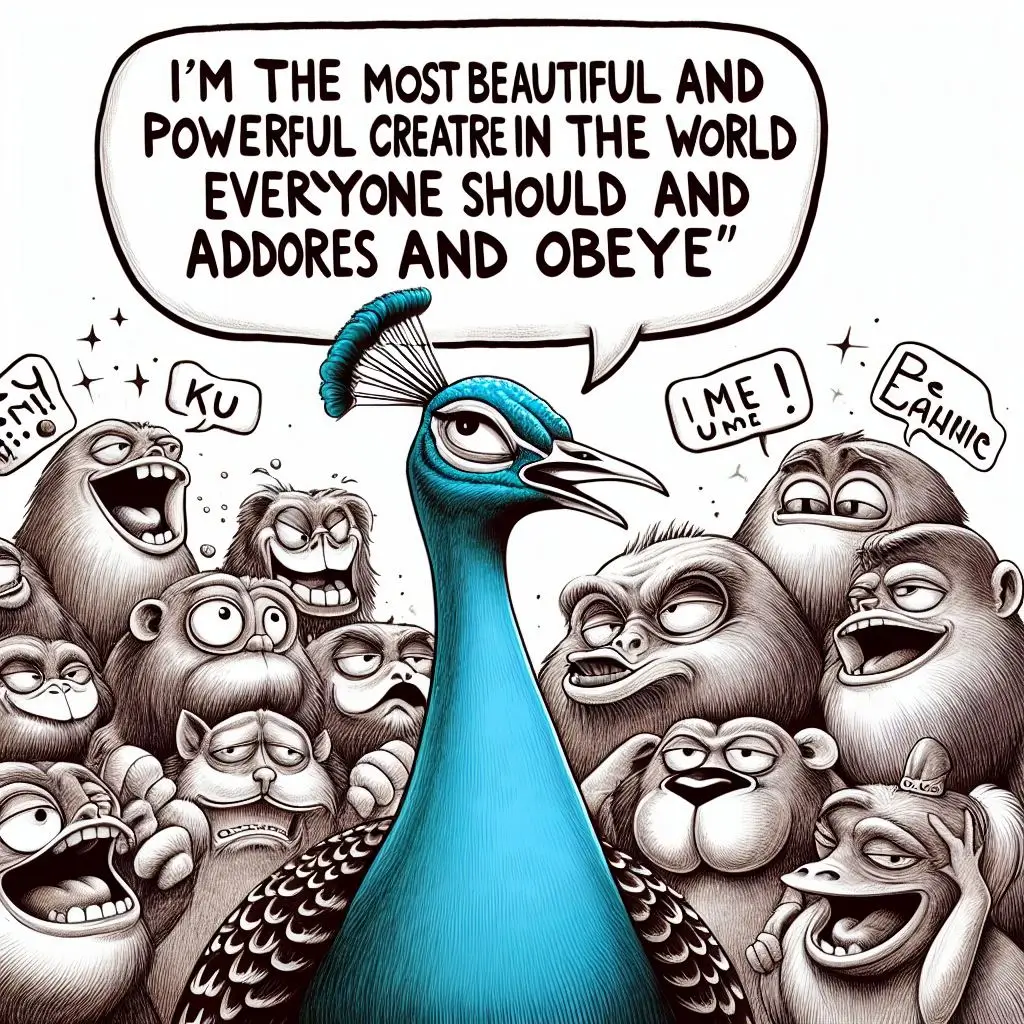Relationships can be draining when feelings and needs take a backseat. Imagine ties with those whose self-importance overshadows all else. These mark narcissists in your life. Subtle yet impactful, narcissistic traits leave emotional turmoil.
Our blog “12 most common traits of narcissists” unveils narcissists’ complex behaviors. From lacking empathy to needing special treatment, we explore nuances influencing personal interactions and bonds.
Join us uncovering narcissists’ hallmark traits, gaining insights to identify and protect from manipulation. Stay informed, empowered, navigating narcissism with newfound awareness.
Understanding Narcissism
Narcissism is a complex personality issue manifesting in various behaviors. It’s excessive self-preoccupation and grandiose self-importance. Those with narcissistic personality disorder exhibit grandiose behavior patterns, lack empathy, and limited genuine connection capacity.
Narcissism involves a pattern where people put themselves first. They prioritize their interests and feelings over others’ needs and experiences. This self-centeredness leads narcissists to feel entitled. They expect special treatment and privileges unreasonably.
Additionally, narcissists often lack genuine empathy. They struggle understanding and acknowledging emotions and perspectives of people around them. This makes forming real connections and maintaining meaningful relationships difficult.
In this article, we’ll explore 12 common narcissist traits. We’ll shed light on their behavior, mindset, and impact on relationships. By recognizing these narcissism signs, people can gain insights. They can learn strategies protecting themselves from these toxic personalities’ manipulation.
Trait 1: Self Obsession

Narcissists’ self-obsession defines them. It significantly impacts their relationships and interactions. They excessively preoccupy with themselves. They often believe their interests and feelings matter most. Their grandiose self-importance leads them to view themselves as superior. They crave constant admiration and validation.
This self-obsession creates dynamics where narcissists seek attention, praise, recognition. They feel entitled to special privilege and admiration. This makes genuine connection and empathy difficult. Interactions become one-sided, focused solely on their achievements and needs. Others’ emotional needs get disregarded.
Impact on Relationships
Self-obsessed individuals like narcissists often harm the quality of relationships they have. Forming genuine bonds is tricky for them, as their focus lies mostly on themselves. They seem delightful initially. However, their selfishness and lack of care soon become apparent.
Narcissists need partners who constantly admire and validate them. This leads to grandiose behavior and unrealistic expectations from their end. They demand only the finest – top jobs, luxury cars, attractive partners. They use others just to fulfill personal needs and desires.
It’s hard for narcissists to recognize others’ emotions and experiences. Empathy evades them; they can’t prioritize loved ones’ feelings. This disconnect leaves partners feeling neglected emotionally, unheard, and unappreciated.
Coping Strategies
If you find yourself with a self-obsessed narcissist, establish boundaries and prioritize self-care. Their excessive demands aren’t your responsibility, nor is providing constant validation.
Clear boundaries protect your emotional needs, preventing a one-sided relationship. Develop healthy coping mechanisms, like confiding in trustworthy friends or professionals, practicing self-care, and asserting your needs.
Realize, you merit a mutually satisfying and genuine relationship. Understanding narcissists’ self-obsession and taking proactive steps shields you. This allows navigating relationships with narcissistic individuals effectively, protecting emotional well-being.
Trait 2: Lack of Empathy

Narcissists display a striking lack of empathy. This greatly hinders understanding or relating to others’ feelings and experiences. This empathy deficiency defines narcissistic individuals, severely impacting relationships and interactions.
1. Inability to comprehend others’ emotions
Narcissists struggle grasping others’ emotions and perspectives. They dismiss or minimize others’ feelings, considering them insignificant compared to their needs and desires. This self-focused worldview challenges deep emotional connection.
2. Lack of emotional support
Due to their limited empathy capacity, narcissists provide no genuine emotional support to those in need. They satisfy their desires and bolster self-image rather than providing comfort or understanding during difficult times.
3. Inauthentic connections
Genuine connections require empathy, truly understanding and connecting with another’s emotional experiences. However, narcissists struggle establishing authentic connections because they primarily fulfill their emotional needs. Their lack of empathy prevents developing meaningful, reciprocal relationships.
4. Manipulating is common with narcissists
They exploit others for their goals. No empathy lets them use vulnerable people without feeling bad. Charm, lies, or force may manipulate others for gain. They ignore others’ emotions.
Narcissists are emotionally detached. In relationships, they lack empathy or real concern. This shallow connection leaves loved ones feeling unimportant, unheard, and emotionally neglected.
In conclusion, narcissists lack empathy. This impacts forming genuine bonds. Their self-centered nature and limited understanding of emotions hinders empathy and authentic emotional support. Recognizing this trait protects from narcissists’ manipulation and emotional detachment.
Trait 3: Hypersensitivity

Narcissists are hypersensitive, stemming from fragile self-worth. They overreact intensely to perceived criticism or rejection, disproportionate to the situation. One of the clear trait of narcissists is hypersensitivity.
The Fragile Ego
People with narcissistic traits have an exaggerated view of themselves. They want constant praise from others to feel good about themselves. Yet, underneath their confident appearance, they feel deeply insecure. They fear being seen as less than perfect. So even small criticisms upset them greatly.
Overblown Reactions and Self-Defense
When criticized or threatened, narcissists may overreact emotionally. They might lash out angrily or find ways to defend themselves. They cannot tolerate any disapproval. To them, it feels like a direct attack on their self-worth. These intense reactions protect their fragile egos. It allows them to seem superior.
Needing Praise and Reassurance
Narcissists’ sensitivity also shows in how much they crave attention and validation. They constantly seek praise and reassurance from others. This helps them feel less inadequate inside. But their never-ending need for approval can be draining for those around them. They incessantly demand attention and affirmation from others.
Manipulative Behavior Patterns
Narcissists might use their hypersensitivity to manipulate situations. By acting like victims, they gain sympathy. This allows them to twist circumstances to benefit themselves or control others. Their dramatic sensitive reactions deflect blame and responsibility away from themselves. At the same time, it maintains their sense of superiority and entitlement.
Stay Safe from Overreactive Narcissists
When dealing with a highly sensitive narcissist, set clear rules and stick to them. Remember, their extreme reactions do not stem from your words or actions – they stem from inner insecurities. By firmly enforcing boundaries and avoiding manipulative tactics from them, you protect your emotional well-being and steer clear of their toxic behavior.
Identifying hypersensitivity in narcissists is crucial. Stay alert and take care of yourself when navigating relationships with such individuals. This safeguards your mental and emotional health.
Trait 4: Overstating Reality

Narcissists constantly overstate their accomplishments, talents, and abilities. They crave admiration and validation, so they inflate achievements to seem superior. Their grandiose self-image drives an unrealistic perception of their capabilities.
Exaggerating Their Successes
Narcissists feel an intense urge to portray themselves as the best at everything. They frequently boast about professional feats, academic triumphs, and personal victories. However, these claims often lack substance – achievements are embellished to appear more impressive. Their goal? To gain attention, impress others, and boost their sense of self-importance.
Talent Inflation
Narcissists desire to seem highly talented. They exaggerate abilities, maybe inventing stories about expertise or recognition, overstating skills. Exaggerating boosts self-esteem and reinforces their desired image.
Grandiose Fantasies
Narcissists fantasize about unlimited success, power, beauty, or wealth. They envision greatness, compensating for insecurities by exaggerating aspirations and idealized self-perception.
Loss of Credibility
Initially captivating with larger-than-life narratives, narcissists’ constant exaggerations erode credibility. As embellishment becomes apparent, trust strains, and skepticism arises.
Protecting Yourself
Recognizing exaggeration patterns protects from narcissists’ manipulations. With those inflating achievements and abilities, maintain skepticism. Observe actions, not self-proclaimed greatness. Surround yourself with humble, authentic individuals.
In the end, narcissists often exaggerate to bolster their grandiose self-image. They overstate achievements, talents, and abilities. This behavior helps navigate relationships with narcissists and shields against manipulative tactics. You can keep an objective view by recognizing their tendency to exaggerate, avoiding sway from false narratives.
Trait 5: Envy

Envy, a powerful trait displayed by narcissists, drives competitive and manipulative behaviors. Healthy individuals feel happy for others’ successes. Narcissists struggle with genuine appreciation, harboring envy instead.
Fueling Competitive Behaviors
Narcissists view life as constant competition where they must outshine others to maintain self-perceived superiority. Encountering someone with desired qualities or achievements, envy takes hold. They become consumed by desire to surpass or undermine that person, driven by need to be seen as best. This envy fuels competitive behaviors, sometimes at expense of others.
Manipulation and Sabotage
Envious narcissists often manipulate and sabotage to gain advantage over perceived rivals. They may spread rumors, withhold information, or violate boundaries in attempt to diminish competitors’ success. Envy-driven actions, strategic and calculated, aim to devalue others while elevating self-importance.
Lack of Fulfillment
Envious narcissists perpetually compare themselves to others. They covet what others achieve or possess. No matter their own success, it never satisfies them. They’re fixated on what others have. The envy-driven mindset breeds dissatisfaction, constantly seeking validation.
Fragile Sense of Self-Worth
Narcissists envy stems from fragile self-worth. Others’ successes undermine their grandiose self-image. Instead of inspiration, they view accomplishments reflecting inadequacy. Their fragile worth magnifies envy, desperately seeking reassurance of superiority.
Breaking the Cycle
Understanding narcissistic envy’s role is crucial. Recognizing underlying motivations protects from manipulation. Set boundaries. Focus on personal achievements and strengths. Avoid competitive games. Maintain emotional distance. Safeguard well-being from toxic influence.
In essence, envy fuels narcissists’ manipulative, competitive behaviors. Comprehending this empowers individuals against narcissists’ influence, prioritizing emotional well-being.
Trait 6: Exploitative Behavior

Narcissists thrive on taking advantage of people to benefit themselves. Driven by self-obsession, their interests come first. Those around them matter little if it means getting what they want.
Manipulation for Personal Gain
Masters of manipulation, narcissists exploit vulnerabilities for their gain. At work, in relationships, or socially, they betray trust and kindness. Their agenda: fulfill desires, no matter the cost.
Disregard for Others’ Well-being
Narcissists disregard how exploiting impacts others. Acquiring resources, advancing careers, stroking egos – these singular aims blind them. Power-hungry, controlling, they’ll harm or manipulate emotions without hesitation.
Lack of Empathy
Empathy evades narcissists, enabling exploitative conduct. Viewing people as tools, they pursue wants heedless of victims’ feelings. Emotional disconnection breeds total disregard for others’ well-being.
Fulfilling Their Narcissistic Supply
Narcissists exploit others to get what they need. Manipulating people lets them feel superior, admired, and validated. They crave control. Exploiting gives them power and dominance, feeding their unquenchable self-absorption.
Impact on Relationships
Narcissistic exploitation wrecks relationships. Their manipulation and selfishness poison trust and genuine bonds. Victims feel used, worthless, drained emotionally. Slowly, relationships deteriorate.
In conclusion, narcissists exploit due to self-obsession, lack of empathy. They manipulate others for personal gain, ignoring consequences. Recognizing this trait protects against toxic influence. Setting boundaries, distancing from manipulation preserves well-being, maintains healthy relationships.
Trait 7: Ruins Relationships

Narcissistic behavior devastates relationships, leaving emotional wreckage. Understanding these toxic dynamics protects against narcissists’ manipulative strategies.
Emotional Manipulation and Control
Narcissists employ a powerful tactic: emotional manipulation. They exploit their partner’s weaknesses, using guilt, gaslighting, and emotional blackmail to control emotions. By undermining self-esteem and warping reality, narcissists gain the upper hand and foster dependency on them.
Lack of Empathy and Emotional Connection
Empathy is a foreign concept to narcissists. They struggle to truly connect with others. Their focus is solely on themselves, their needs, and a sense of superiority. Feelings, needs, and experiences of loved ones are disregarded. This inability to understand and support erodes trust and intimacy.
Constant Need for Validation and Attention
Narcissists crave attention and admiration to validate their worth. In relationships, this manifests as a constant demand for praise, admiration, and special treatment. They must be the center of attention, becoming resentful when needs are unmet. This self-centered behavior emotionally drains partners, leaving them unimportant.
Pattern of Devaluation and Discard
Narcissists frequently devalue partners, diminishing accomplishments, opinions, and worth. This pattern breeds constant insecurity and uncertainty. When partners become too independent or losing value, narcissists discard them without hesitation. Partners feel discarded, confused, and broken.
Build Protective Boundaries and Find Support
Setting up solid boundaries protects from a narcissist’s damaging effects. Do this by limiting emotional manipulation tactics. Prioritize your own needs first. Seek guidance and validation from caring friends, family, or a therapist.
Changing a narcissist is not your duty. Instead, focus energy on personal well-being. Surround yourself with healthy, supportive bonds. Understanding destructive narcissistic patterns safeguards emotional health. It fosters mutual respect and real connection.
Trait 8: Grandiose Boasting

Narcissists make over-the-top boastful statements often. This feeds their superior self-image. It seeks attention and admiration from others too. Making exaggerated claims about talents and abilities projects an air of superiority. It aims to command praise and validation.
Deeply Rooted Self-Importance
Under grandiose statements lies a firm sense of self-importance. Narcissists wholly believe they’re uniquely special. They think exceptional treatment and recognition is deserved. This steadfast self-view provides the basis for constructing grandiose boasts.
Seeking Attention and Admiration
Grandiose claims aim to draw focus and praise from others. Narcissists desperately want people to notice them, using bold statements to gain the desired recognition. Making big claims about their skills or accomplishments is a way to capture interest and create awe and admiration.
Maintaining the Illusion
These grandiose statements also help narcissists uphold the image they want, of being superior and flawless. Constantly boasting about supposed achievements reinforces the belief that they’re exceptional, above the rest. This supports their inflated self-view and constant need for approval.
Manipulative Tactics
While impressive at first, grandiose statements manipulate by making narcissists seem bigger-than-life figures. This makes others feel inferior or indebted to them. By claiming greatness, narcissists control interactions and power dynamics.
Recognizing and Responding
It’s crucial to spot these statements as manipulation tactics to gain control over you. Understand their motivation: inflated claims for self-interest. Stay skeptical, fact-checking claims rationally. Build real connections based on authenticity and mutual respect, not falling for grandiose fronts.
Pay attention, narcissists make grand claims. But these are deceptions. They don’t reflect real skills or success. Stay grounded. Value genuine qualities over flashy shows. Protect yourself from narcissists’ manipulative control.
“Be wary when narcissists boast greatly. These are often ploys to manipulate and dominate, not signs of actual achievements.”
Unknown
Trait 9: Narcissists Manipulate
Manipulative behavior defines narcissists. It’s how they control others for selfish gain. Disregarding others’ needs, they wield tactics to dominate relationships. This section explores narcissists’ common manipulative methods.
Gaslighting: Distorting Reality
Gaslighting is narcissists’ go-to manipulation. They distort reality, denying facts. Victims doubt their perceptions, memories, sanity. Narcissists gain control, leaving victims confused, invalidated, unstable.
Emotional Games: Exploiting Feelings
Skilled emotional manipulators, narcissists exploit others’ feelings for advantage. Guilt-tripping, love-bombing, playing victim—narcissists wield these tactics. Targeting vulnerabilities maintains their power, control in relationships.
Devaluation and Discard: The Cycle of Manipulation
Narcissists often begin relationships on a positive note. They idealize their targets. They compliment and shower them with attention. This helps them gain devotion and trust. However, over time, a pattern emerges. The narcissist starts to devalue their victim.
They dismiss their victim’s feelings. They belittle their achievements and abilities. This erodes their victim’s self-esteem. Eventually, the narcissist may completely discard their victim. They move on, seeking new sources of validation and narcissistic supply.
Triangulation: Creating Conflict
Triangulation is a manipulative tactic narcissists use to create conflict and maintain control. They involve a third party, real or imaginary, in their relationships. This creates jealousy, insecurity, and competition for their victim. The victim feels they must compete for the narcissist’s approval and attention. Meanwhile, the narcissist’s harmful behavior is diverted from scrutiny. This manipulation keeps victims on edge, constantly striving to please the narcissist.
Manipulating Boundaries: Crossing the Line
Narcissists struggle to respect personal boundaries. They frequently violate the emotional or physical space of others. They might excessively pry into private matters, disregarding privacy and consent. They cross these boundaries to assert dominance and control. This leaves their victims feeling violated and powerless. The narcissist’s behavior is a clear violation of the victim’s personal boundaries.
In conclusion, manipulative behavior is a common trait of narcissists. They use tactics like gaslighting, emotional manipulation, devaluation and discard, triangulation, and boundary violations. Their goal is to maintain control over their victims. Recognizing these manipulative behaviors is crucial for protection against narcissists’ toxic influence. By setting firm boundaries and seeking support from trusted sources, individuals can break free from the manipulative grasp of narcissists. This helps them reclaim their emotional well-being.
Trait 10: Entitlement Mentality
Narcissists expect special treatment. They don’t care about others’ needs and feelings. This trait defines narcissistic behavior in relationships and interactions. Narcissists believe they deserve privileges and attention because they think they’re superior. They act very important and expect special treatment always. They think rules don’t apply to them. Narcissists focus only on themselves.
They disregard others’ emotions and boundaries. They expect their desires to come before anyone else’s needs. They exploit and manipulate people for personal gain. Narcissists struggle to connect genuinely with others due to this self-centered mentality. Their focus on self-interest makes empathy difficult. This lack of empathy reinforces their self-absorption, preventing authentic bonds.
Narcissists often manipulate others for their benefit. They charm, deceive, and mistreat to maintain power and feel superior. Their entitlement drives this behavior – viewing people as tools for desires and status.
Recognizing and protecting yourself from entitled individuals is vital. Set firm boundaries. Reject enabling their toxic manipulation. This safeguards emotional well-being and avoids their harmful dynamics. Understanding entitlement allows healthier relationships built on mutual respect and genuine connection.
Dealing with narcissists requires caution and self-care. Surround yourself with supportive people. Seek professional guidance to navigate these complex personality issues.
Trait 11: Lack of Boundaries
Narcissists notoriously disregard personal boundaries – emotional and physical. They overstep and invade others’ space, unconcerned about comfort or consent. I am going to explain this further because it is the important trait of narcissists.
Violation of Emotional Boundaries
Narcissists lack empathy, failing to recognize or respect emotional needs. They disregard emotional intimacy boundaries, manipulating or coercing control over others’ emotions. They insist on knowing personal details, demand constant attention and validation, or intentionally provoke reactions for amusement or dominance.
Invasion of Physical Boundaries
Narcissists have difficulty understanding personal space. They may get too close or touch others unexpectedly. This lack of respect for boundaries shows disregard for individual comfort and autonomy. What others view as polite and considerate, narcissists see as unimportant limitations. They feel entitled to attention and admiration. Personal boundaries don’t apply to their desires.
Manipulation and Control
Disregarding boundaries is key to narcissists’ manipulative tactics. Intentionally overstepping boundaries gives them power over victims. They exploit vulnerabilities to assert dominance. Violating boundaries maintains their superiority complex while ensnaring victims. Boundary violations reinforce the narcissist’s controlling behavior.
Impact on Relationships
Disrespecting boundaries destroys relationships. Constant violations breed discomfort, eroding trust. Genuine connection is impossible without mutual respect for each person’s needs and limits. Narcissists’ callous attitude toward boundaries inevitably sabotages relationships, leaving partners emotionally depleted and drained.
In summary, narcissists have trouble with personal boundaries. This is true for emotional and physical boundaries. They cannot recognize and respect others’ autonomy and comfort. This results in ongoing violation and manipulation. It is crucial to understand this trait to protect yourself from narcissistic individuals’ toxic influence. Establishing and enforcing firm boundaries is essential for self-preservation and well-being when dealing with narcissistic personalities.
Trait 12: Inability to Take Responsibility
A troubling inability to take responsibility for their actions is terrible trait of narcissists. Instead, they resort to a pattern of shifting blame onto others. This trait is a hallmark of narcissistic behavior. It can have significant impacts on their relationships and interactions.
Blame Shifting and Denial
Narcissists deflect and deny any wrongdoing when confronted with their mistakes or negative consequences. They are masters at shifting blame onto others, deflecting accountability, distorting truth to absolve themselves. This behavior pattern can be extremely frustrating and damaging for those dealing with them.
Projection and Gaslighting
Projection is a common tactic employed by narcissists to avoid responsibility. They project their own flaws, mistakes, shortcomings onto others. This makes others the scapegoats for narcissists’ failures or misdeeds. By doing so, they manipulate the narrative, undermine the credibility of those challenging them.
Gaslighting is another technique used by narcissists to avoid accepting responsibility. They intentionally distort facts, memories, and events to confuse and manipulate others into questioning their own perceptions and reality. Gaslighting makes it difficult for their victims to trust their own judgment and ultimately takes the focus away from the narcissist’s actions and onto the victim’s supposed flaws.
Lack of Self-Reflection and Growth
Taking responsibility requires self-reflection and the willingness to acknowledge one’s mistakes and learn from them. However, narcissists have an inherent lack of self-reflection and are resistant to personal growth. They view admitting faults as a threat to their grandiose self-image and would rather protect their ego at all costs. This lack of self-reflection hinders any genuine personal development or meaningful change.
Impact on Relationships
The inability to take responsibility for their actions takes a toll on narcissists’ relationships. Their refusal to acknowledge their faults and apologize can lead to a breakdown in trust and intimacy. It creates an environment of blame and manipulation, where their partners or loved ones are left feeling invalidated and emotionally neglected.
Protecting Yourself
When dealing with a narcissistic individual who refuses to take responsibility, it’s important to establish clear boundaries and prioritize your own well-being. Recognize that you cannot change or fix their behavior, and focus on setting healthy boundaries to protect yourself from their manipulations. Seek support from trusted friends, family, or therapists who can help you navigate these challenging dynamics and develop coping strategies.
In essence, narcissists’ defining characteristic is their inability to take responsibility. This toxic trait leads to blame-shifting, denial, and a lack of self-reflection. These behaviors can seriously damage relationships and interactions. Recognizing this quality and setting boundaries can protect you from narcissists’ emotional manipulation.
Conclusion
In summary, knowing the 12 most common narcissistic traits is critical for recognizing and safeguarding yourself from their toxic influence. Awareness of these traits allows maintaining emotional well-being and healthier relationships.
Throughout this article, we explored narcissists’ self-obsession, which often hinders genuine connections with others. Also, their lack of empathy makes understanding and considering others’ feelings challenging.
Narcissists exhibit hypersensitivity due to fragile self-worth, reacting strongly to perceived criticism or rejection. This hypersensitivity fuels exaggerated claims and constant validation needs. Furthermore, exploitative behavior is prevalent in narcissists. They manipulate and exploit others for personal gain, disregarding others’ well-being. Additionally, their grandiose statements and sense of entitlement contribute to their need for special treatment and personal gain.
Narcissists have trouble with personal boundaries. They often cross lines that are emotional or physical for others. When called out for their actions, they tend to shift blame onto others. They don’t take accountability.
People can recognize these 12 narcissist traits. They can set boundaries to protect themselves from narcissists’ damaging effects. Building real connections, having healthy relationships, helps people lead fulfilling lives. They’re free from narcissistic behavior’s influence.
